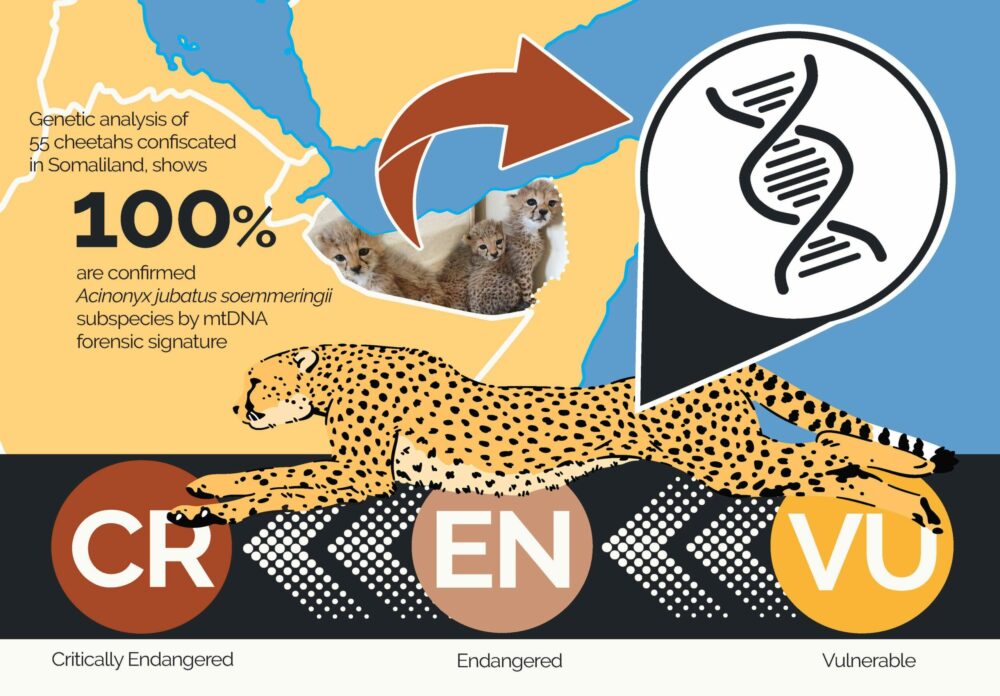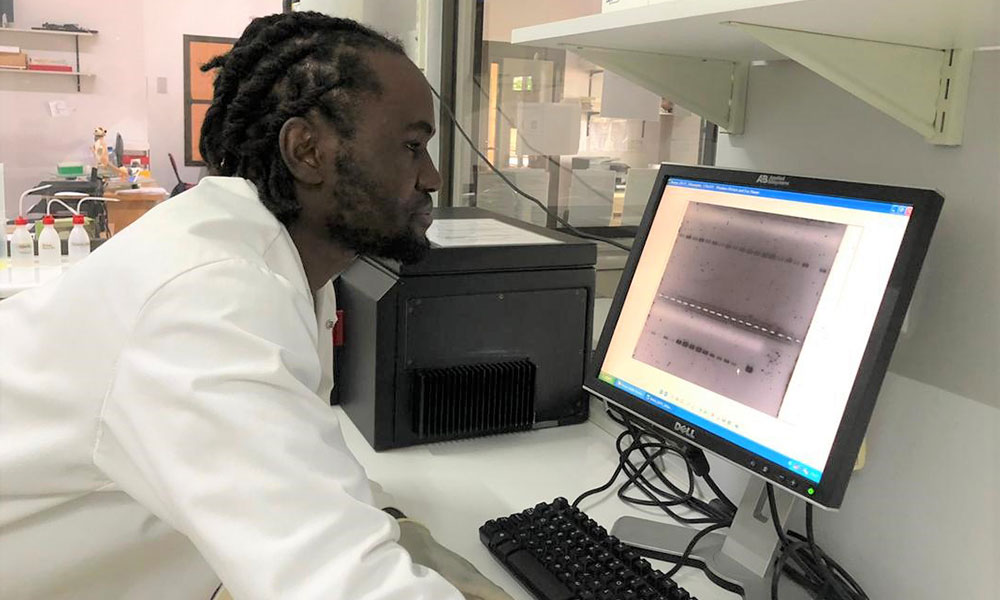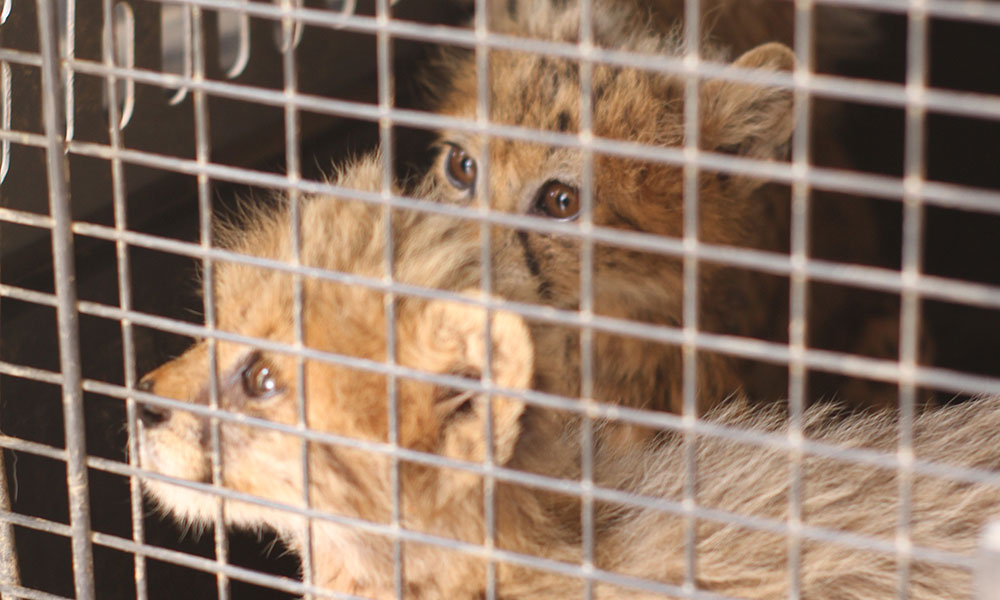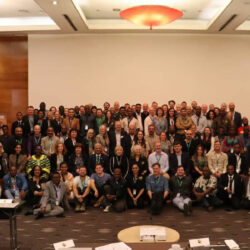New CCF Study Links Illegal Wildlife Trade to Decline of Northeast African Cheetah
-

- by CCF Staff December 14, 2023
For Immediate Release
Otjiwarongo, Namibia [14 December 2023] – The Cheetah Conservation Fund (CCF) genetics team announces the publication of their research paper titled ‘Genetic support to uplist an African cheetah subspecies, Acinonyx jubatus soemmeringii, imperiled by illegal trade’ published in Conservation Science and Practice. The study was published the same week as the IUCN notification of the uplisting of the Northeast African cheetah (Acinonyx jubatus soemmeringii) to ‘Endangered’ on the IUCN Red List and was cited as supporting evidence for the uplisting. CCF’s genetic research played a key role in the uplisting of the cheetah from the Horn of Africa as it was able to provide evidence that the illegal pet trade is affecting this particular subspecies.
“Our genetic research, detailed in the paper titled ‘Genetic support to uplist an African cheetah subspecies, Acinonyx jubatus soemmeringii, imperiled by illegal trade‘ published in Conservation Science and Practice, has been critical in understanding the extent of the impact of the illegal wildlife trade on the Northeast African cheetah. Until then we certainly assumed that the cheetahs traded in the Horn of Africa were coming from Eastern Africa, but we were not able to tell whether the source was local or included regions with higher cheetah densities (such as Kenya and Tanzania, which host a different cheetahs subspecies). Being able to show with our genetic research that the cheetahs affected by the trade are from the Northeast African cheetah subspecies made it clear that the pressures faced by this subspecies were extreme, and an uplisting to Endangered (at least) was warranted,” explains Dr. Anne Schmidt-Küntzel, CCF’s Assistant Director for Animal Health and Research and lead author for this publication.
The journey to uplist the soemmeringii subspecies of cheetah was a comprehensive endeavor spanning approximately a decade marked by rigorous research, data collection, and advocacy by conservationists building a compelling case for action. The efforts of research experts from around the world to compile and present the significant threats and data pointing to the continued population decline of the subspecies, has culminated in the reclassification of its conservation status.
Dr. Laurie Marker, Founder and Executive Director of CCF, adds, “The uplisting of the Northeast African cheetah to ‘Endangered’ is a sobering reminder of the cheetah’s plight but it highlights the great need for range wide conservation efforts and expanded research into this unique animal. The uplisting is a crucial step in our long-standing battle against illegal wildlife trade. Our relentless data collection and on-the-ground actions have not only brought global attention to this issue but have also laid the foundation for stronger conservation policies. This achievement is a beacon of hope and a reminder of the work that still lies ahead.”
Dr. Shira Yashphe, Director of Wildlife Crime and International Policy at CCF, reflects on the significance of the paper to the Red List Uplisting, “The removal of cheetahs from the wild due to the illegal wildlife trade is a tragic loss. Being able to show that the illegal wildlife trade affects the Northeast African cheetah subspecies is a crucial contribution to our battle against the illegal trade. It shows us where we need to focus our law enforcement efforts and which jurisdictions we should focus on for legal reform and community engagement.”
The Hon. Minister Shukri H.Ismail Bandarei, from the Somaliland Ministry of Environment and Climate Change (MoECC) is at the heart of the fight against poachers in Somaliland and was also a part of the team who investigated the origin of the traded cheetahs presented in the paper.
Research also shows that the cheetah’s role in arid landscapes can help mitigate climate change, underscoring the urgency of this issue. CCF’s recent participation at the CoP 28 IUCN Unite for Nature Pavilion on December 3, highlighted the crucial role cheetahs play in combating climate change. In the past century, cheetahs have been reduced to only 9% of their original range. With less than 7,500 cheetahs remaining across their range in the wild, we are at a tipping point. Our collaborative efforts at CCF are focused on reversing this decline.

Captions: Above: Graphic available for use (please inquire) – Cheetah cubs confiscated from the illegal wildlife trade by the Somaliland authorities need intensive veterinary care. Analysis of their DNA provided evidence that the illegal wildlife trade targets Acinonyx jubatus soemmeringii, which provides evidence for the arguments presented for requesting the uplisting of the International Union for Conservation of Nature (IUCN) Red List status of this subspecies. Below left: CCF Researcher and contributer Hafeni Hamalwa working in CCF’s genetics lab, Below right: Cheetah cubs confiscated from the illegal wildlife trade by Ministry of Environment & Climate Change (MoECC) await veterinary treatment at CCF’s Centre in Somaliland.


# # #
Research Authors:
Dr. Anne Schmidt-Küntzel, Assistant Director for Animal Health and Research, Cheetah Conservation Fund
Dr. Shira Yashphe, Director of Wildlife Crime and International Policy, Cheetah Conservation Fund
Hafeni Hamalwa, Laboratory Manager, Cheetah Conservation Fund
Hon. Shukri H. Ismail, Minister of Environment and Climate Change, Somaliland
Patricia Tricorache, Illegal Wildlife Trafficking Research Assistant, Colorado State University, Natural Resource Ecology Laboratory
Dr. Bruce Brewer, General Manager, Head of Bushblok Project, Cheetah Conservation Fund
Stephen J. O’Brien, Professor, Nova Southeastern University (NSU), Halmos College of Natural Sciences and Oceanography
Dr. Laurie Marker, Founder and Executive Director, Cheetah Conservation Fund
Cheetah Conservation Fund
Cheetah Conservation Fund (CCF), established in 1990, is a leading organization in cheetah research and conservation, committed to safeguarding their future in the wild. Known for their remarkable speed, cheetahs are a distinct species among big cats, with their population now below 7,500 globally. They face numerous challenges including human-wildlife conflict, genetic issues, habitat and prey loss, climate change, and illegal trade. CCF operates comprehensive conservation programs to mitigate these threats. With its headquarters in Namibia and a field base in Somaliland, CCF stands as the foremost authority in cheetah conservation. Visit www.cheetah.org for more on their efforts and how to contribute.
MEDIA CONTACTS:
US and Namibia:
Dr. Anne Schmidt-Küntzel, genetics@cheetah.org, +1 240 643 8116, Dr. Laurie Marker, director@cheetah.org, +264 811247887, Shira Yashphe, shira@cheetah.org, +97254 5704959
Related Reading


